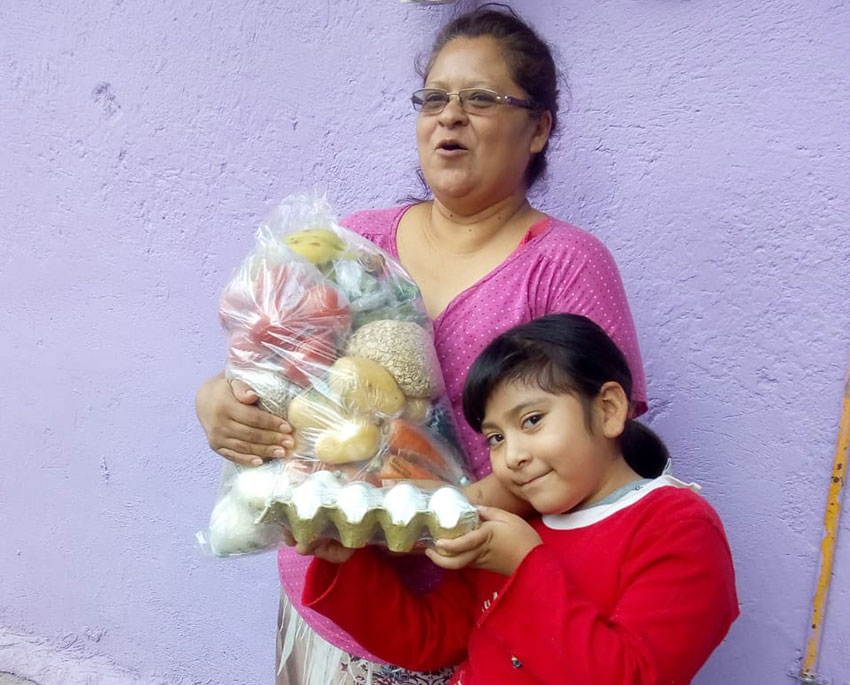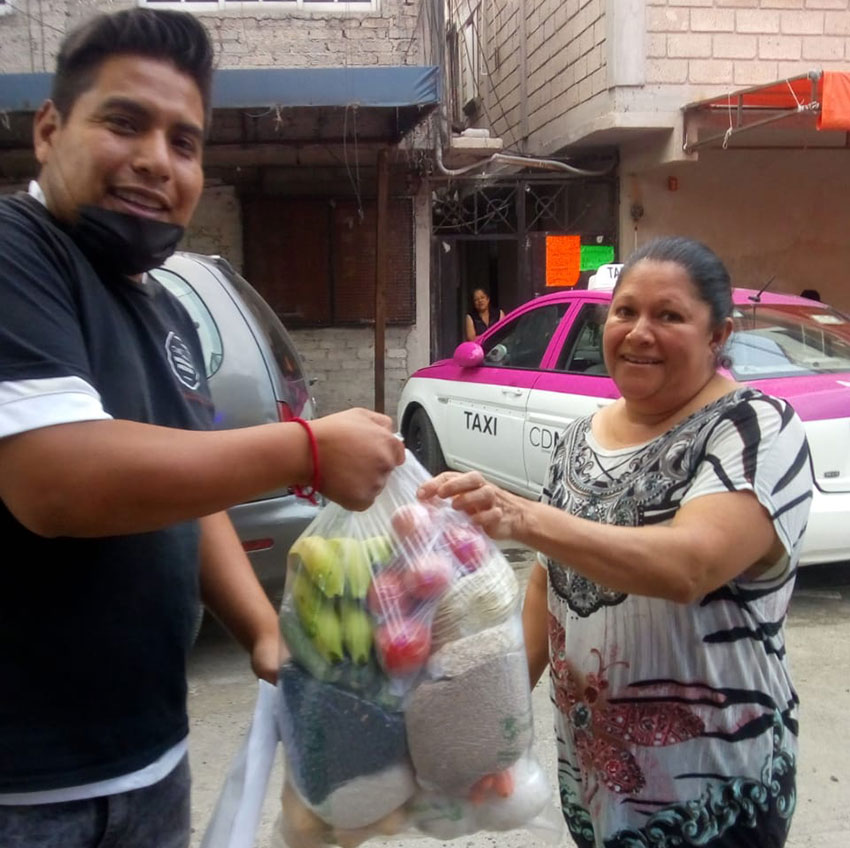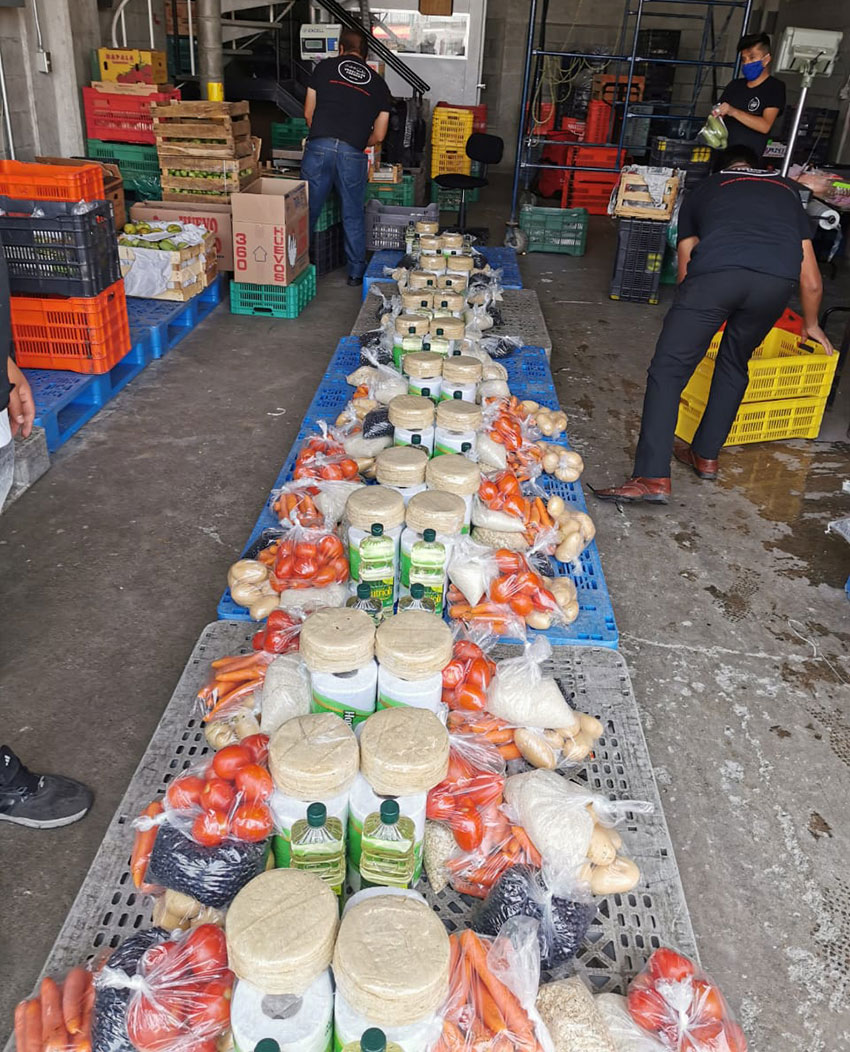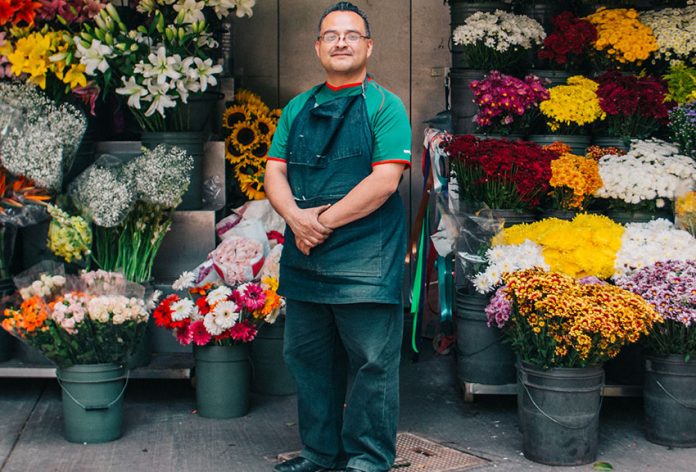Vendors. Thousands of them roam the Mexico City subways, sell tacos on the avenues, and offer artisanal trinkets to passersby. They make up about 10% of the city’s population and are the lifeblood of its streets.
Already one of the most marginalized groups in Mexico City’s economy, they and their customers are being forced off the sidewalk. With little or no savings, minimal access to credit, and no stimulus package, these vendors are in economic peril.
Daniel is one of them, and sells flowers on a corner in one of the city’s central neighborhoods. When the pandemic hit he didn’t think he would make it. He was losing more money each day and getting desperate.
But then appeared a little glimmer of hope. From a friend of a friend, he learned about a network of volunteers and recipients that make up Ayuda Mutua, a local mutual aid group in the heart of Mexico’s capital. When a volunteer from the group showed up at his stand a few weeks ago with a despensa – a basket of basic foodstuffs – he reciprocated with a massive bunch of flowers.
It seems like mutual aid groups have spread almost as quickly as Covid around the globe. Two buzzwords in a world reeling from medical shortages, insufficient financial aid, and rising death tolls. From food aid to babysitting to groups like one in Puerto Rico, originally set up for Hurricane Maria disaster relief, people are leaning on their neighbors like never before.

In Mexico City a lingering mutual aid infrastructure remains from other eras, other times when the city was paralyzed and neighbors forced to rely on each other. When the devastating 1985 earthquake hit, thousands of local volunteers dug through the rubble for survivors and set up shelters in the street. During the 2017 earthquake, local parks were converted to donation centers, cyclists rushed supplies to collapsed building sites, and volunteers made sandwich upon sandwich to feed the suddenly homeless and the emergency workers serving them.
Hannah Swenson remembers arriving in Mexico City at that very moment.
“My first time to Mexico City was a few days before the earthquake. I was staying at this little hostel near Parque Mexico … where we made sandwiches and organized things.
“Energetically, how that felt, and how the city responded, that to me is the root of mutual aid.”
Ayuda Mutua sprung from a simple conversation between Swenson and her roommate – what can we do? Will people need emotional support, they wondered, or someone to run errands and walk dogs? What would be safe to take on? Other friends felt inclined to help as well and small teams of volunteers started to organize around specific goals.
One team would reach out to already established Mexico City non-profits, one would handle calls for requests and relay them to a delivery team, one would get the word out by posting flyers all over the city.

“It started out as friends of friends, neighbors of neighbors,” says Swenson, “but once the word got out, and people started to see us as a trusted resource, the requests multiplied.”
While she may have helped kick this thing off, Hannah quickly demurs at being called the leader or the founder of the group. Like most mutual aid organizations, this one combines horizontal organization and a leader-less structure for collective action. Decision making is led by the current group of volunteers and transparency is woven into the organization’s daily fabric – even how the money gets spent.
There may be a little more receptivity for the concept of mutual aid in Mexico, where citizens are generally distrustful of institutions and the government and have a long history of grassroots uprisings and solidarity movements. Rallying together in times of need is familiar to indigenous communities long neglected in Mexico’s countryside and neighborhoods that have banded together when local government failed.
Ayuda Mutua places no restrictions on who receives aid and who provides relief. If you need something you ask, if you have something to give you offer. Unlike similar groups in other cities, this isn’t neighborhood-exclusive. Volunteers have traveled to the far reaches of the city with dog food, diabetes medication, and even a mattress for a woman who was sleeping on the floor. They’ve helped widowed seniors and out-of-work freelancers.
As weeks of quarantine and pandemic have worn on, a basic and ubiquitous need has surfaced — weekly groceries, like the despensa that Daniel received. Boxes of basics including fresh fruits and vegetables along with staples like rice, beans and tortillas are delivered weekly to families in need. Vegetales Frescos, a third-generation family business in the city’s Central de Abasto market, is helping Ayuda Mutua organize and deliver the baskets for about US $12 apiece.
More of a response team than a non-profit, Ayuda Mutua has joined forces with other groups like Mi Valedor to work with marginalized populations in the city, and Roca de Forteleza that is helping get despensas out to seniors. They’ve also taken requests from Haciendo Calle, a support network for trans sex workers, and Casa Hogar HALAC, a home for children in Tláhuac.

Whatever requests they can fulfill, they do. The over $126,000 that they have raised through crowdfunding campaigns and direct giving has helped to support 289 families through the crisis, but there are still 150+ families on the despensa waiting list. Five flower vendors, including Daniel, just took part in the group’s Mother’s Day flower drive where they raised over $1,300 to be split among them.
“We envisioned a pretty dark panorama during this crisis,” says Daniel, “but thanks to the [Ayuda Mutua] platform we were able to have a great day on Sunday. The happiness of people when we delivered their bouquets was definitely part of the payment for our effort.”
This group, like most of its ilk, will likely dissipate once the crisis has passed and people get back to their regular lives. But for those affected by the support it provided, Ayuda Mutua will bring a handful of Mexico City’s millions just that much closer.
Lydia Carey is a frequent contributor to Mexico News Daily. She lives in Mexico City.
